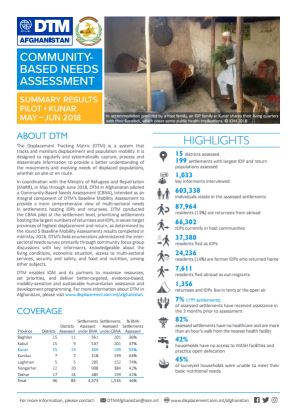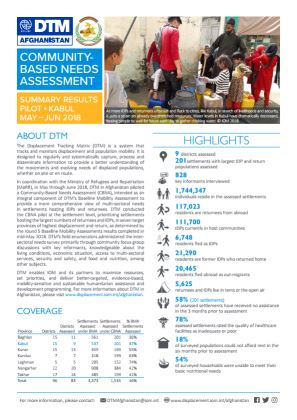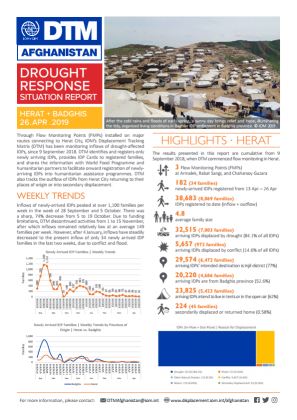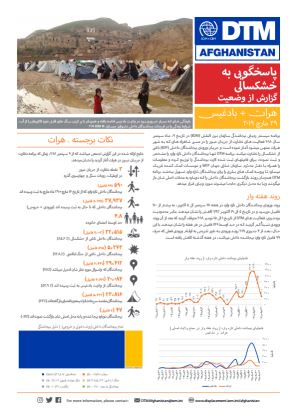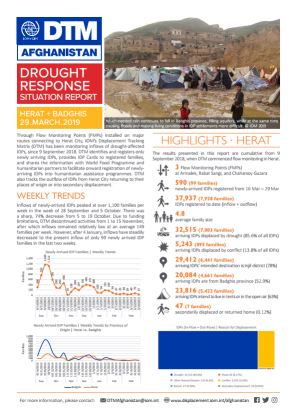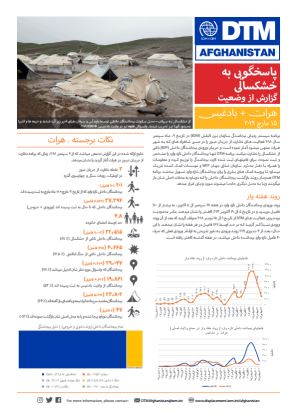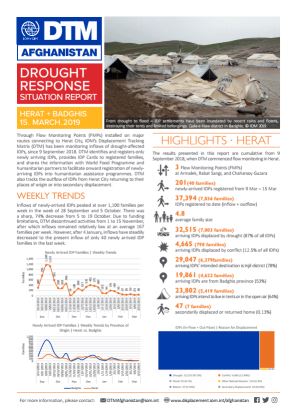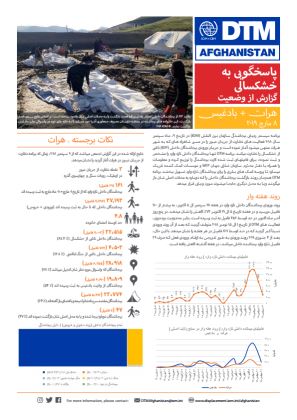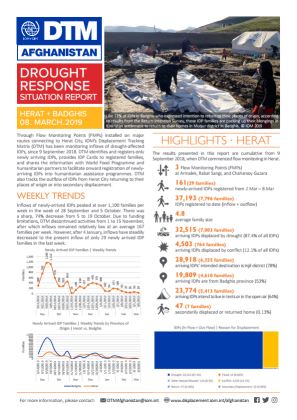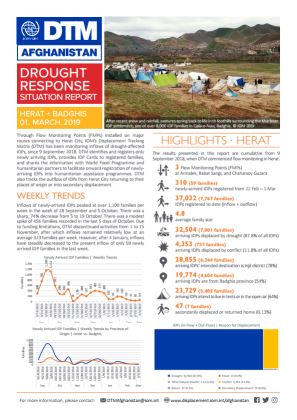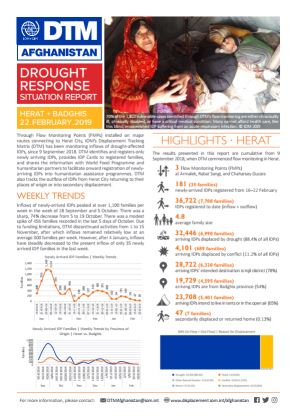-
Countries
-
Data and Analysis
-
Special Focus
-
Crisis Responses
Afghanistan
Afghanistan
IDPs tracked
Displacement Movements
4,187,000
IDMC 2023
Data collection round
About Afghanistan
The Displacement Tracking Matrix (DTM) is an information management system of tools and methodologies used to track and monitor displacement and population mobility. In Afghanistan, IOM activated the DTM programme in January 2017 in response to the substantial increase of Afghans returning home from neighbouring countries, as well as record levels of internal displacement. DTM in Afghanistan is designed to regularly and systematically capture, process and disseminate multi-layered information about the population sizes, locations, geographic distribution, movements, vulnerabilities, evolving multisectoral needs, and the drivers of migration of returnees, IDPs, migrants and mobile populations. DTM implements baseline mobility assessments, flow monitoring, registrations, and various migration surveys to provide an essential evidence base that enables decision-makers and humanitarian, reintegration and development partners to maximize resources and deliver efficient, better-targeted, mobility-sensitive and sustainable humanitarian; reintegration, community stabilization and development programming.
The value-added impact of DTM in Afghanistan is to inform action and results for people in need. DTM Afghanistan implements its activities at both the national and provincial levels. DTM works closely with other (IOM) programmes through referring identified populations in need of assistance at flow monitoring points to IOM’s Cross Border Return and Reintegration, Protection, Humanitarian Assistance, and Reintegration and Development (RADA) programmes. DTM Afghanistan also supports humanitarian partners and clusters, including WFP, FAO, UNHCR, IRC, DRC, NRC, and WHO, among many others, by providing emergency tracking updates in large-scale or sudden onset movements, such as emergency event tracking and drought response. Furthermore, stabilization and development actors, including IOM’s RADA programme, and the World Bank leverage DTM’s information to select priority communities and districts with higher concentrations of IDPs and returnees to receive reintegration and livelihoods assistance and improvements to core infrastructure and essential services. In support of health partners, including WHO, UNICEF, and the Humanitarian Health Cluster, DTM data informs the selection of priority, at-risk districts, border areas, communities, and health facilities in need of strengthened capacity, response, surveillance, and risk education for polio, TB, COVID-19, and other infectious diseases.
Contact
Modher ALHAMADANI
Senior Programme Coordinator - DTM
malhamadani@iom.int
DTM AFGHANISTAN
DTMAFGHANISTAN@iom.int
Current Donors
- Republic of Korea
- Norway
- CERF
- Canada
- Italy
- EU
- FCDO
افغانستان — ارزیابی نیازمندی های مبتنی بر جامعه: لغمان، دوره ۱ :: می— جون ۲۰۱۸
سیستم ردیابی بیجاشدگان (DTM) از ماه می الی جون سال ۲۰۱۸ در هماهنگی با وزارت مهاجرین و عودت کنندگان (MoRR) یک برنامه آزمایشی ارزیابی نیازمندی های مبتنی بر جامعه (CBNA) را به عنوان بخش جدایی ناپذیر از ارزیابی بنیادی تحرکات (BMA) آنجام داد تا دید جامع تر از نیازمندی های چندین سکتوری
افغانستان — ارزیابی نیازمندی های مبتنی بر جامعه: کندز، دوره ۱ :: می— جون ۲۰۱۸
سیستم ردیابی بیجاشدگان (DTM) از ماه می الی جون سال ۲۰۱۸ در هماهنگی با وزارت مهاجرین و عودت کنندگان (MoRR) یک برنامه آزمایشی ارزیابی نیازمندی های مبتنی بر جامعه (CBNA) را به عنوان بخش جدایی ناپذیر از ارزیابی بنیادی تحرکات (BMA) آنجام داد تا دید جامع تر از نیازمندی های چندین سکتوری
افغانستان — ارزیابی نیازمندی های مبتنی بر جامعه: کنر، دوره ۱ :: می— جون ۲۰۱۸
سیستم ردیابی بیجاشدگان (DTM) از ماه می الی جون سال ۲۰۱۸ در هماهنگی با وزارت مهاجرین و عودت کنندگان (MoRR) یک برنامه آزمایشی ارزیابی نیازمندی های مبتنی بر جامعه (CBNA) را به عنوان بخش جدایی ناپذیر از ارزیابی بنیادی تحرکات (BMA) آنجام داد تا دید جامع تر از نیازمندی های چندین سکتوری
افغانستان — ارزیابی نیازمندی های مبتنی بر جامعه: کابل، دوره ۱ :: می— جون ۲۰۱۸
سیستم ردیابی بیجاشدگان (DTM) از ماه می الی جون سال ۲۰۱۸ در هماهنگی با وزارت مهاجرین و عودت کنندگان (MoRR) یک برنامه آزمایشی ارزیابی نیازمندی های مبتنی بر جامعه (CBNA) را به عنوان بخش جدایی ناپذیر از ارزیابی بنیادی تحرکات (BMA) آنجام داد تا دید جامع تر از نیازمندی های چندین سکتوری
افغانستان — ارزیابی نیازمندی های مبتنی بر جامعه: بغلان، دوره ۱ :: می— جون ۲۰۱۸
سیستم ردیابی بیجاشدگان (DTM) از ماه می الی جون سال ۲۰۱۸ در هماهنگی با وزارت مهاجرین و عودت کنندگان (MoRR) یک برنامه آزمایشی ارزیابی نیازمندی های مبتنی بر جامعه (CBNA) را به عنوان بخش جدایی ناپذیر از ارزیابی بنیادی تحرکات (BMA) آنجام داد تا دید جامع تر از نیازمندی های چندین سکتوری قریجات
افغانستان — ارزیابی نیازمندی های مبتنی بر جامعه: تخار، دوره ۱ :: می— جون ۲۰۱۸
سیستم ردیابی بیجاشدگان (DTM) از ماه می الی جون سال ۲۰۱۸ در هماهنگی با وزارت مهاجرین و عودت کنندگان (MoRR) یک برنامه آزمایشی ارزیابی نیازمندی های مبتنی بر جامعه (CBNA) را به عنوان بخش جدایی ناپذیر از ارزیابی بنیادی تحرکات (BMA) آنجام داد تا دید جامع تر از نیازمندی های چندین سکتوری قریجات
Afghanistan — Community-Based Needs Assessment: Nangarhar, Round 1 (May — June 2018)
In coordination with the Ministry of Refugees and Repatriation (MoRR), in May through June 2018, DTM in Afghanistan piloted a Community-Based Needs Assessment (CBNA), intended as an integral component of DTM's Baseline Mobility Assessment to provide a more comprehensive view of multi-sectoral nee
Afghanistan — Community-Based Needs Assessment: Laghman, Round 1 (May — June 2018)
In coordination with the Ministry of Refugees and Repatriation (MoRR), in May through June 2018, DTM in Afghanistan piloted a Community-Based Needs Assessment (CBNA), intended as an integral component of DTM's Baseline Mobility Assessment to provide a more comprehensive view of multi-sectoral nee
Afghanistan — Community-Based Needs Assessment: Kunduz, Round 1 (May — June 2018)
In coordination with the Ministry of Refugees and Repatriation (MoRR), in May through June 2018, DTM in Afghanistan piloted a Community-Based Needs Assessment (CBNA), intended as an integral component of DTM's Baseline Mobility Assessment to provide a more comprehensive view of multi-sectoral nee
Afghanistan — Community-Based Needs Assessment: Kunar, Round 1 (May — June 2018)
In coordination with the Ministry of Refugees and Repatriation (MoRR), in May through June 2018, DTM in Afghanistan piloted a Community-Based Needs Assessment (CBNA), intended as an integral component of DTM's Baseline Mobility Assessment to provide a more comprehensive view of multi-sectoral nee
Afghanistan — Community-Based Needs Assessment: Kabul, Round 1 (May — June 2018)
In coordination with the Ministry of Refugees and Repatriation (MoRR), in May through June 2018, DTM in Afghanistan piloted a Community-Based Needs Assessment (CBNA), intended as an integral component of DTM's Baseline Mobility Assessment to provide a more comprehensive view of multi-sectoral nee
Afghanistan — Community-Based Needs Assessment: Baghlan, Round 1 (May — June 2018)
In coordination with the Ministry of Refugees and Repatriation (MoRR), in May through June 2018, DTM in Afghanistan piloted a Community-Based Needs Assessment (CBNA), intended as an integral component of DTM's Baseline Mobility Assessment to provide a more comprehensive view of multi-sectoral nee
Afghanistan — Community-Based Needs Assessment: Takhar, Round 1 (May — June 2018)
In coordination with the Ministry of Refugees and Repatriation (MoRR), in May through June 2018, DTM in Afghanistan piloted a Community-Based Needs Assessment (CBNA), intended as an integral component of DTM's Baseline Mobility Assessment to provide a more comprehensive view of multi-sectoral nee
Afghanistan — Community-Based Needs Assessment: Summary Results, Round 1 (May — June 2018)
In coordination with the Ministry of Refugees and Repatriation (MoRR), in May through June 2018, DTM in Afghanistan piloted a Community-Based Needs Assessment (CBNA), intended as an integral component of DTM's Baseline Mobility Assessment to provide a more comprehensive view of multi-sector
Afghanistan — Drought Response Situation Report (26 April 2019)
روند ورودی بیجاشـدگان داخیل تازه وارد در هفته ۲۸ ب سـپتم ایل ۵ اکتوبر، به بیشر ت از ۱۱۰۰ ی فامیـل م سـید و در تاریـخ ۵ ایل ۱۹ اکتوبـر ٪۷۴ کاهـش را نشـان میدهـد.
Afghanistan — Drought Response Situation Report (26 April 2019)
Inflows of newly-arrived IDPs peaked at over 1,100 families per week in the week of 28 September and 5 October. There was a sharp, 74% decrease from 5 to 19 October.
Afghanistan — Drought Response Situation Report (29th March 2019)
۱۱۰۰ ت از اکتوبر، به بیشـ� ۵ سـپتم�ب الی ۲۸ روند ورودی بیجاشـدگان داخی تازه وارد در هفته کاهـش را نشـان میدهـد.
Afghanistan — Drought Response Situation Report (29 March 2019)
Inflows of newly-arrived IDPs peaked at over 1,100 families per week in the week of 28 September and 5 October. There was a sharp, 74% decrease from 5 to 19 October.
(دری) Afghanistan — Drought Response Situation Report (15 March 2019)
برنامه سیستم ردیابی بیجاشدگی سازمان بین المللی مهاجرت (IOM) در تاریخ ۹، ماه سپتمبر سال ۲۰۱۸ فعالیت های نظارت از جریان عبور را در مسیر شاهراه های که به شهر هرات منتهی میشود آغاز نموده و جریان ورودی بیجاشدگان داخلی (IDP) ناشی از خشکسالی را نظارت میکند.
Afghanistan — Drought Response Situation Report (15 March 2019)
Through Flow Monitoring Points (FMPs) installed on major routes connecting to Herat City, IOM’s Displacement Tracking Matrix (DTM) has been monitoring inflows of drought-affected IDPs, since 9 September 2018. This report presents cumulative information as of 15 March 2019.
(دری) Afghanistan — Drought Response Situation Report (8 March 2019)
برنامه سیستم ردیابی بیجاشدگی سازمان بین المللی مهاجرت (IOM) در تاریخ ۹، ماه سپتمبر سال ۲۰۱۸ فعالیت های نظارت از جریان عبور را در مسیر شاهراه های که به شهر هرات منتهی میشود آغاز نموده و جریان ورودی بیجاشدگان داخلی (IDP) ناشی از خشکسالی را نظارت میکند.
Afghanistan — Drought Response Situation Report (8 March 2019)
Through Flow Monitoring Points (FMPs) installed on major routes connecting to Herat City, IOM’s Displacement Tracking Matrix (DTM) has been monitoring inflows of drought-affected IDPs, since 9 September 2018. This report presents cumulative information as of 8 March 2019.
Afghanistan — Drought Response Situation Report (01 March 2019)
Through Flow Monitoring Points (FMPs) installed on major routes connecting to Herat City, IOM’s Displacement Tracking Matrix (DTM) has been monitoring inflows of drought-affected IDPs, since 9 September 2018.
Afghanistan — Drought Response Situation Report (22 February 2019)
Through Flow Monitoring Points (FMPs) installed on major routes connecting to Herat City, IOM’s Displacement Tracking Matrix (DTM) has been monitoring inflows of drought-affected IDPs, since 9 September 2018.
Pagination
Pagination
Pagination
- First page
- Previous page
- 1
- 2
- 3
- 4
- 5











